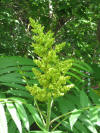WILD
FOODIES' HOME PAGE
PLANT PROFILE LIST
NAME: Staghorn Sumac
SPECIES / FAMILY: Rhus Typhina / Anacardiaceae
OTHER COMMON NAME(S):
CONDITIONS:
sun-partial shade
|
PARTS: |
EDIBLE |
TASTE |
RAW/COOK |
SEASON |
|
All |
|
|
|
|
|
Shoots |
|
perfumish/ |
RAW/COOK |
|
|
Leaves |
||||
|
Stalk/Stem |
|
|
|
|
|
Buds |
||||
|
Flowers |
|
|
|
|
|
Fruits |
|
lemon |
RAW/DRY |
Summer/Fall |
|
Pods |
|
|||
|
Seeds |
|
|
|
|
|
Nuts |
|
|
|
|
|
Roots |
|
|
|
|
|
Bark |
|
|
|
|
PORTION: small
COMMENT: Fruit soaked in cold or warm water makes a native lemonade. Sieve to remove irritating hairs.// Berry cooked and used in pies etc. The fruit is rather small and with very little flesh, but it is produced in quite large clusters and so is easily harvested. When soaked for 10 - 30 minutes in hot or cold water it makes a very refreshing lemonade-like drink (without any fizz of course). The mixture should not be boiled since this will release tannic acids and make the drink astringent.(1) There is another edible part to the sumac: Young shoots, peeled. First year shoots off old stumps are the best, but the spring-time tips of old branches are also edible but not as good. Look at the end of a shoot after you break it off. If you see pith, which is an off-white core, it is too old. Break off that part then look again. You want a shoot stem that is all green inside. Then strip off the leaves and peel the shoot. You can eat it raw or cooked. They very purfume-ish and slightly astringent. (2)
CAUTION: Berries must be red-ripe; white sumac berries are very toxic. (4) When making lemonade, sieve any liquid through cheesecloth, handkerchief, or other fabric to remove sumac hairs, otherwise liquid could irritate the throat. // There are some suggestions that the sap of this species can cause a skin rash in susceptible people, but this has not been substantiated.(1) Anyone with known allergies to any member of the Cashew Family should avoid consuming sumac.(6)
NUTRITION/MEDICINAL: Minor traces of vitamins and antioxidants (4) Antihaemorrhoidal; Antiseptic; Astringent; Blood purifier; Diuretic; Emetic; Galactogogue; Poultice; Stomachic; Tonic; VD; Warts.(1)
LOOK-A-LIKES:
POISONOUS LOOK-A-LIKES: Poison sumac bush, but it has no fruit. https://en.wikipedia.org/wiki/Toxicodendron_vernix
OTHER USES: All parts of the staghorn sumac, except the roots, can be used as both a natural dye and as a mordant. The plant is rich in tannins and can be added to other dye baths to improve light fastness. The leaves may be harvested in the summer and the bark all year round.(3) Dye; Hedge; Hedge; Ink; Mordant; Musical; Oil; Pipes; Shelterbelt; Soil stabilization; Tannin; Wood. The leaves are rich in tannin, up to 48% has been obtained in a controlled plantation. They can be collected as they fall in the autumn and used as a brown dye or as a mordant. The bark, especially the root bark, and the fruits are also very rich in tannin. A yellow dye can be obtained from the roots. An orange dye can be obtained from the inner bark and central pith of the stem, mixed with bloodroot (Sanguinaria canadensis). A black ink can be made by boiling the leaves and the fruit.(1)
SOURCE LINKS (may include nutritional and medicinal info, plus other uses):
- https://pfaf.org/user/plant.aspx?LatinName=Rhus+typhina
- http://www.eattheweeds.com/sumac-more-than-just-native-lemonade
- https://en.wikipedia.org/wiki/Rhus_typhina
- http://www.foragingtexas.com/2008/08/red-sumac.html (good photos)
- https://www.edibleeastend.com/2012/08/09/harvest-sumac
- http://www.aihd.ku.edu/foods/smooth_sumac.html
- https://commons.wikimedia.org/wiki/Rhus_typhina (good photos)
- https://www.seriouseats.com/2013/09/foraged-flavor-all-about-sumac.html (recipe)
- https://www.pinterest.com/jmcoaks/sumac-recipes/?autologin=true (recipes)
- https://www.mamaslebanesekitchen.com/drinks/sumacade-refreshing-sumac-drink



